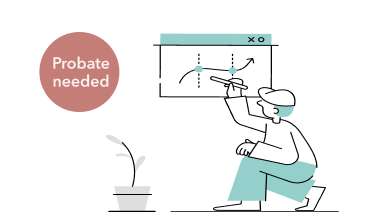
Owned their own home
- owned a property
- this was in their sole name
Probate is likely to be needed because the property can’t be sold or transferred without it.
Use our questionnaire to find out if you need probate to deal with the property, money and possessions of someone who has died.

Probate is likely to be needed because the property can’t be sold or transferred without it.

Probate is likely to be needed to deal with either of these assets.

Probate is unlikely to be needed because these assets will simply transfer to the surviving owner.

Probate is unlikely to be needed because most banks will release up to £30,000 without probate.
The easiest way to find out if you need probate is to complete our interactive 'do I need probate?' questionnaire. We’ll help you understand if you need probate and give you a no obligation, fixed fee quote.
We were contacted by Sky whose father, Mervyn, had recently died. He had left a complex will so Sky knew she would be unable to administer the estate herself.
Watch the video or read how we helped Brian and Sky.
Whether probate is needed depends on what 'assets' were owned by the person who died.
Examples of assets include bank accounts, property and shares.
It's likely you'll need probate if the person who died had any of these assets:
If you're still not sure if you need probate, use our probate questionnaire.
The need for probate doesn't depend on whether there's a will, it depends on the financial situation of the person who died. The process is very similar regardless of whether there's a will or not, but some of the terminology is different.
Every bank and financial institution has their own limit and their own approach to probate. Some have a threshold for probate of £5,000, while others have raised it to £50,000.
To make matters more complicated, some banks and financial institutions will say that if the overall value of the deceased person’s estate is (for example) £15,000, probate is required. Others will say that probate is only needed if there is £15,000 in the individual account.
So you’ll need to confirm with the organisations holding the deceased person’s assets as to what their threshold for probate is. This will determine whether or not probate is needed.
For more information, see bank limits for probate.
If the person who died owned joint assets, such as a joint bank account or a property as joint tenants, this will pass to the surviving co-owner under the right of survivorship. The co-owner will need to produce the death certificate to formally transfer the asset into their sole name, but usually won’t need probate to do this.
Whether or not probate will be needed to deal with a property will depend on how it's owned. Probate will always be needed to sell a property owned in the deceased's sole name, but it's not always needed to transfer a property to a surviving joint owner.
Learn more about selling a property after someone has died.
Again, it depends how the assets were owned. Many couples own their home as joint tenants and have joint bank accounts, meaning probate wouldn't be required. But probate could be needed for any large assets owned in the deceased's sole name, or a property owned as tenants in common.
Premium Bonds are governed by National Savings and Investments (NS&I). If the Premium Bonds holding is more than £5,000, probate will be required.
After a Premium Bond holder dies, NS&I can keep the holding in the prize draw for up to 12 months. A claim form will need to be completed that asks NS&I to either keep the bonds in the prize draw or encash them.
Find out more about probate and Premium Bonds.
Whether any of the estate assets form part of a will trust has no bearing on the need for probate. If a will includes a will trust which needs to be dealt with as part of the probate process, probate may take longer. The need for probate depends on the assets in the estate though, not whether there is a trust.
Co-op Legal Services is the largest provider of probate and estate administration services in England and Wales, and is trusted to deal with over £3 billion in estates annually.
Co-op Legal Services has over 800 staff working in different businesses with offices in Manchester, Bristol, Stratford-upon-Avon, Sheffield and London.